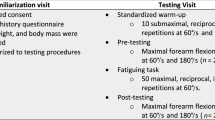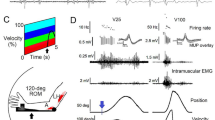Abstract
We have tested the hypothesis that agonist and antagonist muscle fatigue could affect the final position of rapid, discrete movements. Six subjects performed consecutive elbow flexion and extension movements between two targets, with their eyes closed prior to, and after fatiguing the elbow extensor muscles. The results demonstrate that elbow extension movements performed in the post-test period systematically undershot the final position as compared to pre-test movements. However, attainment of the aimed final position in elbow flexion movements was unaffected by fatiguing of the extensor muscles. Undershoot of the final position obtained in extension movements was associated with agonist muscle fatigue, a result that was expected from the point of view of current motor control theories, and that could be explained by a reduced ability of the shortening muscle to exert force. On the other hand, the absence of the expected overshoot of the final position when the antagonist is fatigued, indicates the involvement of various reflex and/or central mechanisms operating around the stretched muscle that could contribute to returning the limb to the standard final position after a brief prominent overshoot.
Similar content being viewed by others
Author information
Authors and Affiliations
Additional information
Accepted: 8 April 1999
Rights and permissions
About this article
Cite this article
Jaric, S., Blesic, S., Milanovic, S. et al. Changes in movement final position associated with agonist and antagonist muscle fatigue. Eur J Appl Physiol 80, 467–471 (1999). https://doi.org/10.1007/s004210050619
Issue Date:
DOI: https://doi.org/10.1007/s004210050619




